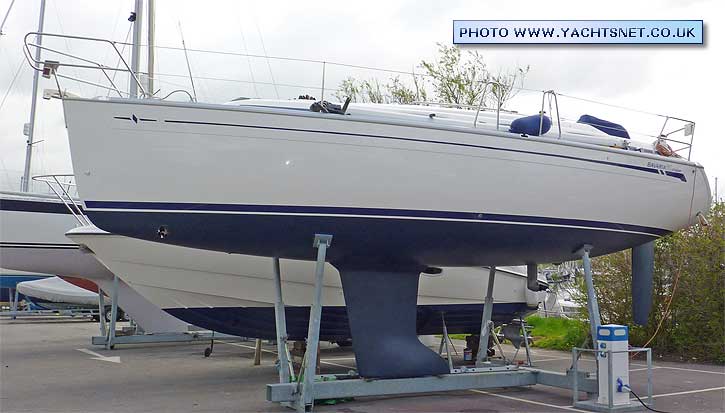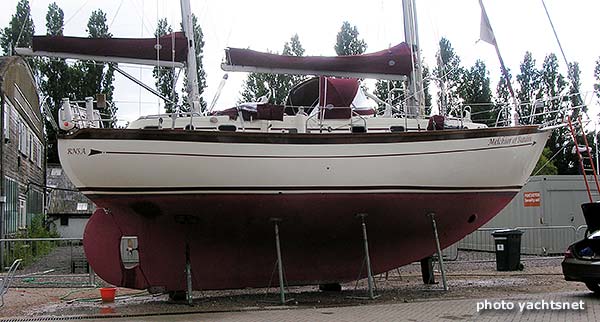How much boat is required.?
Discussion
TTwiggy said:
itannum990 said:
Bilge keel/lifting keel..?
For longer passages, neither (IMHO). Wing keel or long keel (IMHO). If you only want to go mud-plugging round the east coast of England then bilge is best however!Bilge keel is basically a twin keel boat so its stands up in harbours that dry out and is shallower that a fin (single) or long keel. Bilge keel boats won't point as high (as close to the wind) and have less directional stability than a long keel boat. So its all down to what you want in terms of the types of port you will visit and the types of sailing/length of trip you plan to do.
My Europe trips have been in botyh fin keel and bilge keel boats. Our Fin keel needed about 8ft of water and our bilge keel (same boat for the rest of it) just under 6ft.
I preferred the latter, you could get closer to beaches, the boat stays upright (usually) if the place you have anchored dries out.
Bilge keel
Fin keel

Long Keel

Lifting Keel

Wing Keel

blueg33 said:
Lifting wing keel is good.
Bilge keel is basically a twin keel boat so its stands up in harbours that dry out and is shallower that a fin (single) or long keel. Bilge keel boats won't point as high (as close to the wind) and have less directional stability than a long keel boat. So its all down to what you want in terms of the types of port you will visit and the types of sailing/length of trip you plan to do.
My Europe trips have been in botyh fin keel and bilge keel boats. Our Fin keel needed about 8ft of water and our bilge keel (same boat for the rest of it) just under 6ft.
I preferred the latter, you could get closer to beaches, the boat stays upright (usually) if the place you have anchored dries out.
Bilge keel

Fin keel

Long Keel

Lifting Keel

Wing Keel

Thats all very helpful. I didnt even know there was much going on under the hull, thinking row boats on a larger scale!Bilge keel is basically a twin keel boat so its stands up in harbours that dry out and is shallower that a fin (single) or long keel. Bilge keel boats won't point as high (as close to the wind) and have less directional stability than a long keel boat. So its all down to what you want in terms of the types of port you will visit and the types of sailing/length of trip you plan to do.
My Europe trips have been in botyh fin keel and bilge keel boats. Our Fin keel needed about 8ft of water and our bilge keel (same boat for the rest of it) just under 6ft.
I preferred the latter, you could get closer to beaches, the boat stays upright (usually) if the place you have anchored dries out.
Bilge keel
Fin keel

Long Keel

Lifting Keel

Wing Keel

The keel isn't just there to stop the boat getting blown over (though that is an important part!). When reaching (i.e sailing towards the wind), the keel and sails work together like the wings of a plane, creating lift and allowing the boat to be 'sucked' to windward, as opposed to blown along (when the wind is abaft the beam - further back than the mid-point of the boat). When reaching, the boat will heel over.
This probably sounds very complex, but I reckon I could teach anyone with a modicum of intelligence to sail in an afternoon (not to the level of winning regattas, but certainly able to make the boat go via wind only).
This probably sounds very complex, but I reckon I could teach anyone with a modicum of intelligence to sail in an afternoon (not to the level of winning regattas, but certainly able to make the boat go via wind only).
TTwiggy said:
Fittster said:
Who wants just one hull?
I don't trust cats. They turn over and stay there!Fittster said:
I think the retort to that is normally, "better than being dragged to the bottom by a big piece of lead'.
Anyway two is soooo old fashioned, tris are where it is today.
It's not being dragged to the bottom by it that you need to worry about, it's when it falls off mid-Atlantic...Anyway two is soooo old fashioned, tris are where it is today.
markmullen said:
I spent the weekend doing RYA Safety Boat under the Forth bridges and we spent some time sorting out cats, wily little things aren't they, you'd get it righted from a capsize and it'd be off like a shot given the chance. We were unclipping the mainsheet to depower them to stop them romping off up the river.
They can be great fun at dinghy size, but the big ones tack about as well as a square-rigger 
V8 FOU said:
Most large ish 30ft+ say, will do about 1 or 2mpg. The real problem is that running on red diesel, at £1 per litre or less, is only usable in the UK. If you venture into Europe, especially Holland or Belgium, you WILL be fined. France has a bit more laissez - faire. Also remember, it takes around 2000 litres of white to remove all traces of red.
They key to any boat adventures is training and experience. I would suggest that your first couple of long passages are done with someone who has experience - there are plenty of people who do this for a living.
The flat-bottomed boat above? Keep to rivers and coastal. Especially with those old engines.
don't forget diesel in France is much much cheaper than the UK , on a recent trip to France I paid £1.15 on the autoroute and about £1.04 in a small town They key to any boat adventures is training and experience. I would suggest that your first couple of long passages are done with someone who has experience - there are plenty of people who do this for a living.
The flat-bottomed boat above? Keep to rivers and coastal. Especially with those old engines.
V8 FOU said:
Most large ish 30ft+ say, will do about 1 or 2mpg. The real problem is that running on red diesel, at £1 per litre or less, is only usable in the UK. If you venture into Europe, especially Holland or Belgium, you WILL be fined. France has a bit more laissez - faire. Also remember, it takes around 2000 litres of white to remove all traces of red.
They key to any boat adventures is training and experience. I would suggest that your first couple of long passages are done with someone who has experience - there are plenty of people who do this for a living.
The flat-bottomed boat above? Keep to rivers and coastal. Especially with those old engines.
That's a bit pessimistic; I'd expect it to do more like 3-4mpg at a sensible cruise speed(1.5-2gal per hr@~6kts), although you'd burn nearer 2 at full speed(~8-9kts with those engines).They key to any boat adventures is training and experience. I would suggest that your first couple of long passages are done with someone who has experience - there are plenty of people who do this for a living.
The flat-bottomed boat above? Keep to rivers and coastal. Especially with those old engines.
Fittster said:
blueg33 said:
For a sailing boat, you need as a very minimum to do an RYA day skipper course, you may need an ICC.
Even better is a Coastal Skipper qualification, especially if you want to do some longer hops.
You don't need, there are many people competently sailing about without having sat in RYA course. Even better is a Coastal Skipper qualification, especially if you want to do some longer hops.
No experience, 18ft wooden boat: http://www.amazon.co.uk/Shrimpy-Record-Voyage-Eigh...
What can be done and what you want to do might not be the same thing.
Edited by Fittster on Monday 8th September 13:09
Over the years we have rescued a number of leisure sailors who had got into trouble, manly thgrough poor navigation skills and poor boat handling skills.
I would suspect that many of the untrained ones have a childhood of dinghy sailing etc.
I learnt in dinghy's from the age of 5 and sailed every weekend from then on, me and my dad even taught a BT Global; challenge skipper to sail when he was 10, but I did my Yachtmasters at the age of 40 and still learnt alot.
blueg33 said:
Over the years we have rescued a number of leisure sailors who had got into trouble, manly thgrough poor navigation skills and poor boat handling skills.
Interesting you should say that. In my experience, people generally get into trouble when the 'mechanicals' let them down - i.e the engine goes kaput or the boat starts taking on water etc. I've not seen anybody get into serious trouble through lack of boat craft. Embarrassment certainly, but not peril 
TTwiggy said:
Interesting you should say that. In my experience, people generally get into trouble when the 'mechanicals' let them down - i.e the engine goes kaput or the boat starts taking on water etc. I've not seen anybody get into serious trouble through lack of boat craft. Embarrassment certainly, but not peril 
We mainly sail in the solent
Have rescued/helped people as follows:
Dismasted through a very poor gybe in strong winds (watched them do it)
Inability to get through the Needles against the tide (called them up and suggested they wait behind Hurst Castle)
numerous groundings behind Brownsea island (I have taught people how to use an anchor to pull them off)
Guiding people back to the channel when they were about to hit the Bramble Bank
Rescued a water skier halfway between Southampton water and Cowes. He was just floating in the water, no life jacket and no tow boat in sight. Nearest boat was circa half a mile away. He had hypothermia after being in the water for nearly half an hour.
My parents have done a few more incldung a muppet who managed to hit an Isle of Wight ferry
blueg33 said:
TTwiggy said:
Interesting you should say that. In my experience, people generally get into trouble when the 'mechanicals' let them down - i.e the engine goes kaput or the boat starts taking on water etc. I've not seen anybody get into serious trouble through lack of boat craft. Embarrassment certainly, but not peril 
We mainly sail in the solent
Have rescued/helped people as follows:
Dismasted through a very poor gybe in strong winds (watched them do it)
Inability to get through the Needles against the tide (called them up and suggested they wait behind Hurst Castle)
numerous groundings behind Brownsea island (I have taught people how to use an anchor to pull them off)
Guiding people back to the channel when they were about to hit the Bramble Bank
Rescued a water skier halfway between Southampton water and Cowes. He was just floating in the water, no life jacket and no tow boat in sight. Nearest boat was circa half a mile away. He had hypothermia after being in the water for nearly half an hour.
My parents have done a few more incldung a muppet who managed to hit an Isle of Wight ferry
itannum990 said:
blueg33 said:
...... a muppet who managed to hit an Isle of Wight ferry
How the f
 k did he manage that?!
k did he manage that?!
See also: everything that happens in a boat happens really slowly, until it all happens much too fast.
Gassing Station | Boats, Planes & Trains | Top of Page | What's New | My Stuff



